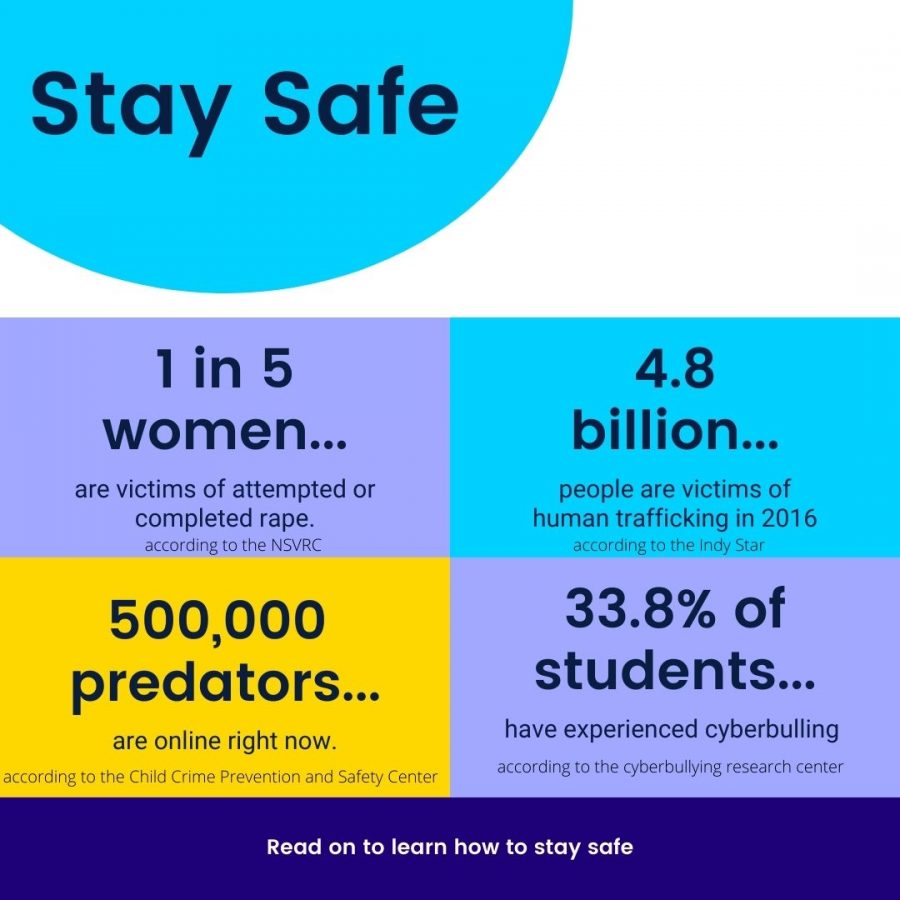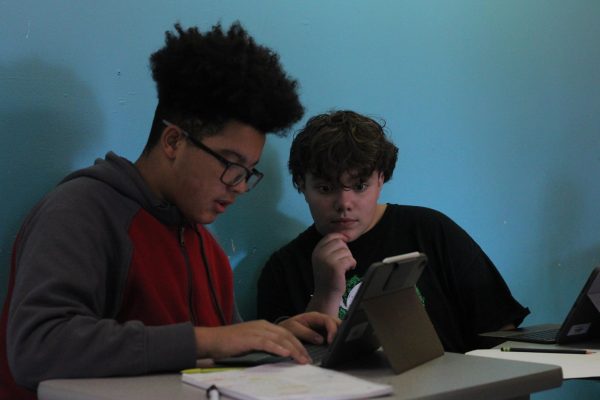Awareness of Stranger Danger Still Relevant in Adolescence
Knowing the facts can help you stay safe, so learn how to avoid disaster.
4.8 million people were victims of sex trafficking in 2016. One out of every five women has been a victim of attempted or completed rape according to the Indy Star. There are an estimated 500,000 predators online right now. The world is a very dangerous place. Especially for teenagers. With technology and the internet, a whole world of new dangers has emerged.
Now, perhaps more than ever, staying safe is essential. Sexual assault, human/sex trafficking, and kidnapping dominate news feeds. But there are some tips to help avoid disaster:
- Avoid dangerous areas, especially at night.
- Don’t be alone at night.
- Stay away from substances that can put you at risk or make you more susceptible to dangerous situations or people.
- Know who you can call for help.
- Stay in groups.
- Stay away from truck stops and stops off interstates.
- Don’t meet random people off the internet alone or in person.
According to Newsome Nelson, “Sex and human traffickers are extremely manipulative. They often use extravagant ruses to induce potential victims before turning to threats and violence to hold them captive and force them to perform unwanted work and sex acts.” Victims of sex/human trafficking often have an inability to speak for themselves.
When they do speak, it seems rehearsed or scripted. They could also be submissive or fearful in public, and they could have tattoos that indicate being owned. They might also have a much older “romantic” partner. Call the human trafficking hotline if you think you have seen or know about human trafficking going on.
A 34 year veteran, Maryland Heights Police and School Resource Officer Mike Mooney explained what he believes is another factor to sex/human trafficking other than the looming dangers of social media. “We have a lot of family dysfunction. Children don’t have a firm foundation so they go out and they seek it and these predators are out there looking for these types of kids whether they’re boys or girls. They get out there and they get involved with someone that is going to ‘clothe you and feed you and love you’ and then it’s very difficult to get them out. Not just physically getting them out, which we can do, but the psychological aspect of that. The mental health system isn’t prepared to do that and that’s a long term problem.”
Officer Mooney said that safety issues 20 years ago were simpler. Worries included walking outside after dark and getting jumped or people lurking outside waiting for victims. Now, the worries are much more complex.
For Officer Mooney, a main safety concern is social media. “[Adolescents are] posting photos and lying about themselves. They meet strangers through that and it puts them in systems where they’re not protected and they’re very secretive about their lives,” Officer Mooney said.
According to C.S. Mott Children’s Hospital in their study on the top health concerns for children in 2015, “Internet safety was the 4th most commonly identified ‘big problem,’ up from #8 in 2014. Sexting received the biggest change in rating this year, from #13 in 2014 to #6 in 2015.” The study noted other major concerns included childhood obesity, bullying, and drug and alcohol abuse.
Since the development of apps like Yubo and Omegle, teens seem to have forgotten the basic lesson of Stranger Danger, perhaps because the threat is now a virtual issue. Yubo claims that there are millions of teens all over the world on their app. The internet has infiltrated multiple aspects of everyone’s lives now, from doing research for a paper or scrolling through Instagram. Students know that countless online predators hunt for people’s credit card information or social security numbers, which often leads to identity theft or usage of a credit card without the cardholder’s knowledge.
But, predators also use the internet as a way to find addresses or to get people to meet up with them in person, culminating in human/sex trafficking, assaults, kidnapping, or home invasions. While students like to dabble with apps or websites such as Omegle or Yubo, it could lead to disaster.
“A new Pew Research Center survey finds that 59% of U.S. teens have personally experienced at least one of six types of abusive online behaviors,” Pew Research Center finds. The six types of online abuse behaviors include, name calling, spreading of false rumors, receiving unwanted explicit pictures, constant asking of where they live/are, physical threats, and having explicit pictures of oneself shared without consent. There are ways to avoid things like this.
Internet safety tips can help:
- Don’t post or share personal information like your full name, birth date, social security number, address, or card information.
- Keep privacy settings on.
- Make sure your wifi connection is safe. You could get on a wifi that could allow someone to hack your computer or phone through the wifi.
- Be careful on online sites. One click could lead to you being hacked.
- Be careful what you download off the internet. It could be encoded with a virus.
- Make strong passwords. Use capitals, numbers, symbols.
- Be very careful who you meet with after meeting online. Verify their identity. FaceTime them first. If you still want to meet, meet in a public place. Make sure other people know where you are and when you’re supposed to get back. Meet in groups if you can.
- Keep up with antivirus software.
In case of emergencies, call 911 or a local police station. Here are some hotlines for more specific, non-emergency situations:
National Suicide Hotline: 1 800-273-8255
National Human Trafficking Hotline: 888-373-7888
National Sexual Assault Hotline: 1 800-656-4673
National Domestic Abuse Hotline: 1 800-799-7233
National Cybersecurity Hotline: 1-888-282-0870
This website is for reporting domestic violence that will close out the tab and erase it from your history with one click of a button.
Being safe does not mean that students cannot have fun. It just means they need to be careful. Following these tips can help them stay happy and healthy.
Your donation will support the student journalists of Pattonville High School. Your contribution will allow us to purchase new equipment and cover our annual website hosting costs.






